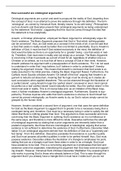Essay
How successful are ontological arguments?
- Institution
- OCR
An A** 40-mark A-Level Philosophy essay assessing the success of ontological arguments. From the Arguments Based on Reason topic within the OCR RS curriculum. Written by an A-Level student who achieved an A* in A-Level Religious Studies (a.k.a Philosophy and Ethics) (2022) and a Grade 9 (A**) in G...
[Show more]



